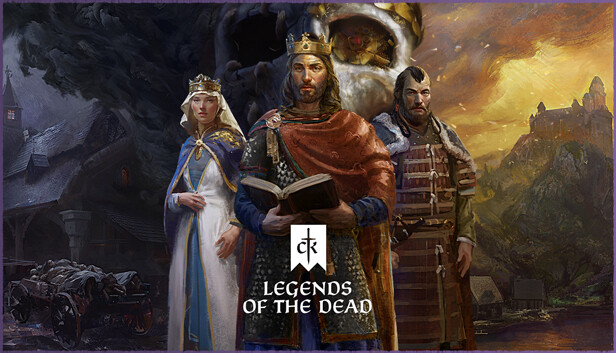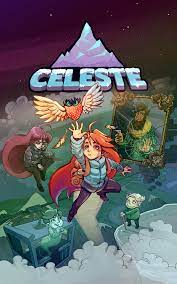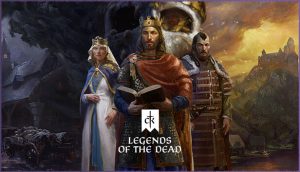
Paradox Interactive divides Crusader Kings III’s development plan into annual milestones called chapters. According to the developers, Chapter III, coming out this year, is the most ambitious in the history of this medieval RPG (which many people still consider a strategy game for some reason). It contains three add-ons and a cosmetic set: besides Legends of the Dead, which is the subject of this review, two more DLCs will be released before the end of the year, not so large, but no less interesting. Roads to Power is dedicated to managing the Byzantine Empire and traveling around the map in search of glory and riches, and the Wandering Nobles event set will add variety to the stories that can happen to your character on the road.
Opening the new chapter is the already available Legends of the Dead add-on. Legends, Wandering Nobles and Legitimacy – now we’ll tell you how these new additions will affect your characters.
Rider on a white horse
All sorts of diseases were present in CKIII at release, and the effects of diseases could be the reason for prematurely changing the main character to an heir. Nevertheless, this aspect of the game clearly needed more elaboration – especially if we remember the DLC for the second part of The Reaper ‘s Due. Against the background of the latter, the diseases in the vanilla version were not scary at all – it was clear that the developers would have to do something about it sooner or later.
And they did. Diseases became an integral part of life of any inhabitant of the Middle Ages. They even developed a special map mode for epidemics, where you can clearly see how diseases spread around the world, and a separate information board allows you to study each disease in detail and prepare in advance for possible infection of your subjects.
Although all diseases are divided into several basic types, each individual epidemic has a unique name, often based on character names and place names, which contributes a lot to the atmosphere. Or rather, it would, if it weren’t for the translation problems that often lead to bloopers like “Totil’s Cough” (in honor of a nobleman named Totil, whose domain the disease originated in).
Winds can infect individuals, which can result in significant penalties to stats and death, and provinces are also affected – the higher the level of the disease, the lower the control, development, and safety of traveling to that province. Now you have to plan your outings more carefully – no one wants to catch some bloody diarrhea on the way to a feast.
Funerals have appeared among the activities – you can honor a recently deceased relative. There’s nothing stopping you from using this event for personal gain, including murder or seduction: the intent mechanic from Tours & Tournaments applies here.
The insatiable Black Death – a pandemic plague of the mid-12th century that killed almost half of the population of Europe – is left by the developers “for the sweet”. It inevitably begins near the end of the game, and it is almost impossible to resist it – almost everyone who could not prepare adequately will go to the grave. According to the developers, they wanted to make the Black Death another challenge for the player, along with the nomadic invasion. However, in the settings you can disable this attack or change its danger and period of appearance.
The foster daughter of history
Flaws and bugs like the mentioned bug with the names of epidemics, unfortunately, are not uncommon for the add-on. For example, after the measles epidemic, half of my characters started wearing iron masks – so here is displayed the “Disfigured Face” perk, which is a consequence of the disease. There seems to be logic in it, but the result is annoying – in previous versions of CKIII such masks were very rare.
Legends – another important feature of DLC – also have problems. The text builder of these very legends gives out quite incoherent stories, moreover, suffering from grammatical errors – at least in the Russian localization.
You have to “play it out in your head”, so to speak, based on the impact that legends have on gameplay. They come in three types: heroic, holy, and legitimizing – and three levels of quality: famous, prominent, and mythical. In order to start your own legend, you need a foundation – an incipient legend. It can be obtained by fulfilling certain conditions – sometimes it is enough to be a descendant of a famous dynasty, and sometimes it is necessary to perform a real feat: to win a holy war, to obtain an imperial title or to kill a special beast in a hunt.
Once activated, the character owns the legend – he spends a considerable amount of money to maintain it, but receives a whole set of useful modifiers. They depend on the type of legend: heroic ones give more prestige, holy ones – piety, and legitimizing ones bring recognition. Legends can spread across the map, giving bonuses to provinces and other nobles who “patronize” the legend. This is another variant of “coloring” the map – an activity for those who are bored with exclusively military methods.
And there is a whole layer of new events and activities associated with legends. You can tell legends at feasts and meetings, speak with them in front of the public and – the most interesting – to make changes to the text: for example, to correct the “unfortunate error” of the chronicler, because of which earlier in the feat mentioned the victory over an ordinary boar, and not the destruction of the dragon, which, as everyone knows, happened in reality. Both text and modifiers change – as a result, by the time you decide to complete the legend (while getting a very large set of bonuses at the same time), an ordinary story about winning a war can turn into a heroic epic that has little in common with the original source. Something like this actually happened – a reminder of how deep the level of immersion and realism in CKIII is.
God’s anointed
In contrast, the developers have introduced a new game concept – legitimacy, which, along with the Black Death, should act as a limiter on the way to world domination. Now you have to not only monitor the accumulation of prestige and the opinion of other characters about your person, but also keep in mind the indicator of legitimacy – the measure of trust of vassals to the suzerain. There are five levels from illegitimacy to ordination. Notable advantages start at the last two – anything below that will hinder normal rule.
Gaining legitimacy can be done in many ways, from winning a war to spreading legends. Losing it is even easier: besides the obvious defeats on the battlefield and loss of titles, there may be more exotic options. And also the inhabitants of the kingdom will probably begin to doubt the legitimacy of your rights to the throne in the case of a devastating epidemic affecting the capital – what kind of vicar of God on earth is he if his subjects are dying like flies?
But on the whole, I didn’t notice much effect from the appearance of this deterrent mechanic. Perhaps I need to play a couple more games, and then this feature of the add-on will reveal itself better. But now, as before, I have problems with vassals only when I change the ruler, and then it’s easy to gain legitimacy with the help of activities like tours or tournaments.
Unlike the good Tours & Tournaments, Legends of the Dead leaves mixed feelings. Yes, it has everything that the developers promised – legends, epidemics and new legitimacy mechanics – but there are enough questions about both the quality and quantity of content, especially against the background of not the most modest price tag of the add-on. I was hoping for more.
Crusader Kings III hasn’t gotten worse – it’s still the best RPG about medieval rulers. If you want to infect yourself with the plague (virtual, of course) and make a legend about it, prepare 1,099 rubles (that’s how much the add-on costs). But don’t think that the expansion will add a lot of new things to this marvelous game.
Pros: new classes, abilities and events related to diseases and legends will diversify the life of characters; cosmetic changes.
Cons: there is too little content, and what there is, in some places is poorly developed.





